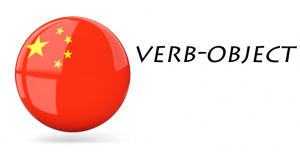Language/Mandarin-chinese/Grammar/Separable-verbs
Hello everybody!
In today's lesson, we will teach you how to use certain kinds of verbs that still need a complement.
"Separable verbs" get their name from their ability to "separate" into two parts (a verb part and an object part), with other words in between. In fact, you could also simply call separable verbs "verb-object phrases."
Feel free to edit this wiki page, if you think it can be improved.
Object verbs
If the verb 說/说 (shuō) "to speak" is followed by a complement, it is used alone:
- 我說漢語/我说汉语。 (Wǒ shuō hànyǔ.)
I speak Chinese.
But if we simply mean "talk", we must add a "standard complement ": 話/话 (huà).
To say "He speaks.", we have to use 他說話。/他说话。 (Tā shuō huà.) and not simply 他說。/他说。 (Tā shuō.).
We also have already seen "write" 寫/写 (xiě) which requires the standard complement 字 (zì):
- 她寫字。/她写字。 (Tā xiě zì.).
She writes.
Attention, it is absolutely necessary to remove the standard complement when another complement is specified.
The following sentence is therefore false: 他說話漢語/他说话汉语。 (Tā shuō huà hànyǔ.)
A verb-object may be heard alone, but in this case the complement is implied:
- (漢語)我會說,不會寫。/(汉语)我会说,不会写。 [(Hànyǔ) wǒ huì shuō, bú huì xiě]
(Chinese) I can speak it, but not write it.
As is said, there can be other words in between of the verb and the object. Let's see how it works:
- 我上了課。/我上了课。 (Wǒ shàng le kè.).
I went to class.
In dictionaries, a combination of a separable verb and an object are noted with “//” between their pinyin.
Main Separable Verbs
| Chinese | Pinyin | Translation |
|---|---|---|
| 上课 | shàng kè | to have a class |
| 住院 | zhù yuàn | to be hospitalised |
| 发烧 | fā shāo | to get a fever |
| 吃饭 | chī fàn | to eat |
| 开学 | kāi xué | to start a new term of school |
| 开车 | kāi chē | to drive |
| 打的 | dǎ dī | to get a taxi |
| 游泳 | yóu yǒng | to swim |
| 看病 | kàn bìng | to see a doctor |
| 睡觉 | shuì jiào | to sleep |
| 聊天 | liáo tiān | to chat |
| 说话 | shuō huà | to speak |
| 起床 | qǐ chuáng | to get up |
Sources
https://resources.allsetlearning.com/chinese/grammar/Separable_verb
http://www.chine-culture.com/chinois/cours-de-chinois-6-grammaire.php

